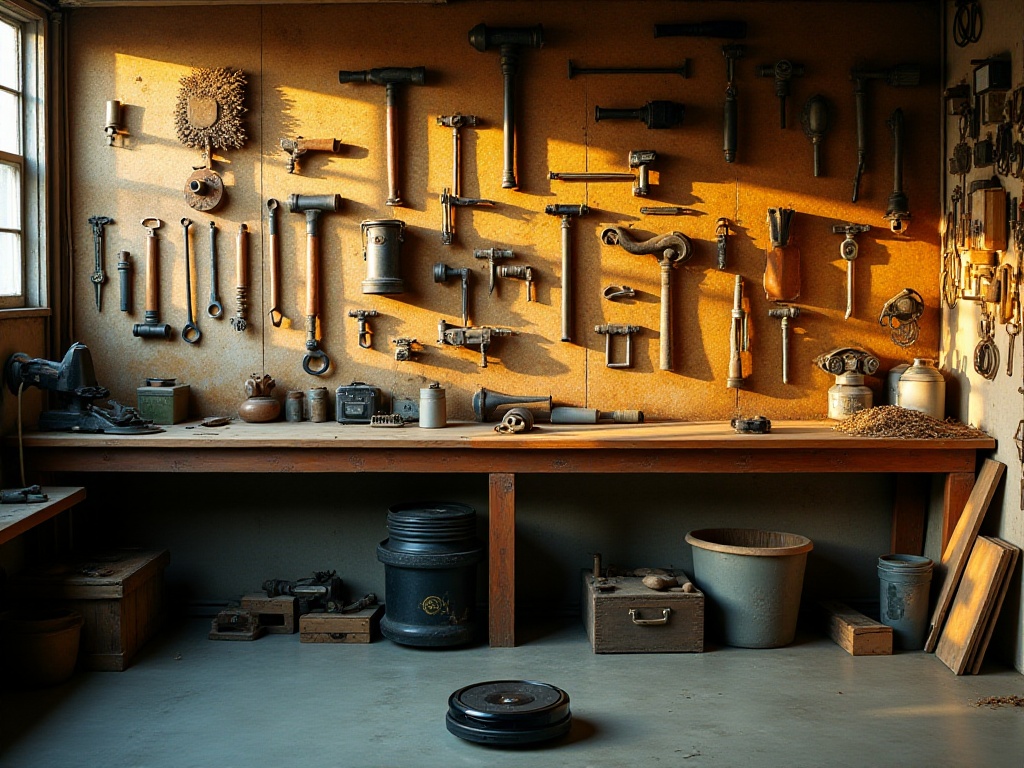
Introduction
As a recent graduate working my first job, rent takes up a major portion of my salary, and adding repair costs on top really gives me a headache. However, after a few years of exploration, I've discovered that many problems don't require calling a repair person - you can fix them yourself!
I remember when I first started renting, I would foolishly wait for repair people to come fix any issue, having to take time off work to wait at home and pay hundreds or thousands in repair fees. Looking back now, that money could have been saved. For example, last month my neighbor paid 600 yuan to have a plumber fix their clogged toilet, while I solved the same problem with a 20-yuan plunger.
From my old rundown rental to my current second-hand home, I've experienced all sorts of housing issues. Leaks? Clogs? Wall cracks? These are no problem now. Today I'll share my years of accumulated experience to help you become a home repair expert too!
Safety First
Honestly, I completely understand why young people often ignore home safety inspections. With busy work schedules and fast-paced lives, who has time to check equipment that seems fine? But after experiencing a few close calls, I deeply realized the importance of safety checks.
For example, last year when my friend's smoke detector battery died, they didn't pay attention to it. One day while cooking noodles, they dozed off and the pot boiled dry. If it weren't for neighbors smelling smoke and warning them in time, the consequences would have been unthinkable. Since then, I've developed a habit of checking safety equipment monthly.
Specifically, every first weekend of the month, I do these things: First is checking smoke detectors and carbon monoxide detectors. Press the test button - if it makes a clear alarm sound, it's working properly. I also use a vacuum cleaner to clean dust from the device surface to ensure sensors aren't blocked.
Next is checking power outlets in each room. Many young people like to plug multiple devices into power strips, which can be very dangerous. My suggestion is to feel if outlets are warm. If you find outlets that are hot, yellowed, or loose, they need to be replaced immediately.
Gas safety is also important. I apply soapy water to gas pipe connections - if bubbles appear, there's a gas leak. Many young people now use gas water heaters, so this check is really important.
Electrical circuits are also key inspection items. Look for exposed wires and loose switches. Especially in humid areas like bathrooms and kitchens, make sure all appliances and outlets have ground fault circuit interrupters installed.

Regular Maintenance
When it comes to regular maintenance, many people think it's very troublesome, but once you develop the habit, it's really not much work. I've lived in my current house for three years - well-maintained areas look like new, while neglected areas show obvious wear.
Let's start with the kitchen. I know you're already tired after coming home from work and cooking, but I really recommend spending five minutes cleaning. If you don't regularly clean the range hood's grease filter, grease will build up thicker and thicker, not only affecting ventilation but also breeding bacteria. My method is to soak the filter weekly in hot water with dish soap, then gently scrub with a soft brush and rinse clean.
The stove is also a key maintenance item. Many people are too lazy to wipe up oil splatters from cooking, and over time it becomes black and sticky. Actually, if you just wipe with paper towels after cooking and spray some cleaner to wipe down, this problem won't happen at all. I also regularly check the gas stove's burner holes, using toothpicks to clear any holes blocked by grease so the flame stays even.
I think bathroom maintenance is most important. Humid environments are most prone to mold growth, and once mold forms in tile grout, it's especially troublesome to clean. My current practice is to use a squeegee to remove water from walls and glass doors after each shower, then run the exhaust fan for 15 minutes.
Toilet maintenance shouldn't be neglected either. Many people only think about cleaning when it's clogged, but using a toilet brush regularly can prevent many problems. I also periodically pour in descaling agent to clean invisible pipe walls.
For flooring, I currently have hardwood floors which need special attention to prevent water damage. I always use a barely damp mop when cleaning, then open windows to ventilate so the floor dries quickly. All furniture legs have anti-scratch pads to prevent scratching the floor.
Door and window maintenance is also important. I regularly clean the tracks and apply some lubricating oil so they slide easily. Window screens get vacuumed monthly to prevent dust buildup from affecting ventilation.
Seasonal Maintenance

Spring Cleaning
Spring is the best time for comprehensive inspections. After winter, houses may develop various issues, and the warmer weather is perfect for checking everything.
First is roof inspection. Although we live in apartments, water leaks from top floor units can affect lower floors. I pay special attention to water stains or mold traces on the ceiling. If problems are found, notify property management or the landlord immediately.
Exterior wall inspection is also important. Last year I found a crack in my balcony wall and had property management repair it promptly. If not discovered early, it could have leaked during rainy season. The waterproofing layer on balconies especially needs timely repair if damage is found.
Window seals may crack from cold contraction in winter, so spring is key for checking them. I run my hand around window frames to feel for drafts. If I find aging seals, I replace them myself - it's a simple operation.
Spring is also good timing to check air conditioners. Before it gets too hot, test run the AC and listen for unusual sounds. Filters must be cleaned thoroughly so there won't be odors when running the AC in summer.
Summer Care
In summer, air conditioning system maintenance is most important. Before first use, I vacuum clean the outdoor unit's heat sink. You might not know that the outdoor unit's heat dissipation directly affects cooling efficiency.
AC filter cleaning is critical. I remove and rinse them with water every two weeks. Dirty filters not only affect cooling but also breed bacteria. When washing, be careful not to use too hot water to avoid deformation.
Drain pipes need regular checking too. ACs produce condensation during operation - if drain pipes clog, water flows back and wets walls. I use thin wire to clear drain pipes, then pour in some bleach to prevent clogs.
Summer sun protection for balconies is also important. I installed shade nets on my balcony, which not only reduces indoor temperature but protects furniture from direct sunlight. Shade nets need regular cleaning or accumulated dust will affect their effectiveness.
Fall Preparation
Fall is key for winter preparation. First check door and window seals. At night I use a flashlight from outside to check for light leaking through gaps. If sealing is poor, replace the weatherstripping promptly.
Rain gutter cleaning is very important. I clean out leaves and debris to ensure smooth drainage. If pipes have cracks or are loose, repair or replace immediately. Last year a resident in our complex had basement flooding from uncleaned rain gutters - repairs cost tens of thousands.
Heating systems need advance checking too. I clean dust from radiators and check valves for leaks. If there's any dripping or leaking, fix it before heating season starts.
Fall is also good timing to check roof waterproofing. While weather isn't too cold yet, I check the waterproofing layer for damage. If problems are found, handle them before snow comes or snow melt will cause bigger losses.
Winter Protection
Cold is winter's biggest enemy. First is pipe freeze prevention. I wrap insulation around pipes, especially near exterior walls. When temperatures are especially low, I leave faucets slightly running to prevent freezing and bursting.
Radiators need regular air bleeding. If you hear gurgling sounds from radiators, it means there are air bubbles that need releasing. I bought a special bleeding key - very convenient to use.
Floor heating needs special attention too. I check the floor heating pressure gauge daily - sudden pressure drops may indicate system leaks. Floor heating pipe leaks are especially troublesome to repair, so pay attention regularly.
Door and window insulation is also important. I applied a layer of insulation film on windows - works very well. Door bottom seals prevent cold drafts from entering.
Innovative Techniques

Mold Removal Tips
Regarding mold removal, I have several secret methods. Bathroom mold is hardest to deal with - after trying many methods, I found white vinegar and baking soda most effective. The specific method is: mix white vinegar and baking soda 1:1 into a paste. Apply to mold spots, wait 30 minutes, then gently scrub with a brush.
This method is not only eco-friendly but very economical. Commercial mold removers cost dozens of yuan per bottle, while vinegar and baking soda together cost just over ten yuan and can be used many times.
I also discovered that after cleaning mold spots, spraying tea tree oil helps. Tea tree oil has natural anti-mold properties that prevent regrowth. Of course, maintaining ventilation is most important - that's the fundamental solution.
For mold in tile grout, I use a toothbrush with mold remover to scrub carefully. After scrubbing, rinse thoroughly with water then dry with a hair dryer. Finally apply a mold preventive coating - this can maintain mold-free conditions for a long time.

Floor Repair
Hardwood floors inevitably get dents. I used to think floor dents required professional repair until discovering the "steam method." Just cover the dent with a damp towel, then iron over it. Wood expands with steam, naturally restoring dents.
However, this method requires technique. First, iron temperature can't be too high or it will damage the floor. Second, don't iron too long - generally 30 seconds is enough. If it doesn't fully recover the first time, wait for the floor to cool before trying again.
For floor scratches, I use walnut meat to rub them. Walnut oils can fill shallow scratches with natural color. Deeper scratches can be fixed with special floor wax sticks. I bought a set of color-matching wax sticks online that can match almost all common wood floor colors.
Another tip is putting felt pads under furniture feet. This prevents scratching when moving furniture. I also regularly wax the floor - this not only protects it but makes it more lustrous.

Final Words
After saying so much, the most important part of home maintenance is persistence. Like skincare, daily basic maintenance is more effective than occasional deep treatments. Now when I get home from work, I spend about ten minutes doing simple maintenance like wiping surfaces and ventilating. Then deeper cleaning on weekends keeps the house in good condition.
These experiences are what I've figured out over the years - maybe not the most professional methods, but definitely practical. I hope this helps friends who also worry about home maintenance. If you have any unique repair techniques, welcome to share in the comments.
Finally, manual skills really can be cultivated. I started not knowing anything either, but as long as you're willing to learn and try, you'll slowly discover many problems aren't as hard as imagined. So rather than paying for repairs, try doing it yourself. You might become the repair expert among your friends!
Next
Comprehensive Home Maintenance Guide 2025: Refresh Your Home and Say Goodbye to Repair Troubles
A systematic guide to home maintenance covering safety system inspections, major household equipment care, daily cleaning routines, seasonal maintenance tasks, and practical repair techniques for establishing a comprehensive home care system
A Daily Glass of Lemon Water Will Quietly Transform Your Body
A comprehensive guide on establishing a healthy lifestyle through weight management, balanced nutrition, exercise planning, and essential home maintenance including daily cleaning and professional care tips
Life Hacks: Making Your Home Smarter and More Convenient
Discover practical life hacks and home maintenance techniques, from preventing doors from locking with rubber bands, cleaning microwaves with lemon, seasonal gutter cleaning, to sealing windows and doors for improved energy efficiency and comfort.
Next

Comprehensive Home Maintenance Guide 2025: Refresh Your Home and Say Goodbye to Repair Troubles
A systematic guide to home maintenance covering safety system inspections, major household equipment care, daily cleaning routines, seasonal maintenance tasks, and practical repair techniques for establishing a comprehensive home care system

A Daily Glass of Lemon Water Will Quietly Transform Your Body
A comprehensive guide on establishing a healthy lifestyle through weight management, balanced nutrition, exercise planning, and essential home maintenance including daily cleaning and professional care tips

Life Hacks: Making Your Home Smarter and More Convenient
Discover practical life hacks and home maintenance techniques, from preventing doors from locking with rubber bands, cleaning microwaves with lemon, seasonal gutter cleaning, to sealing windows and doors for improved energy efficiency and comfort.


